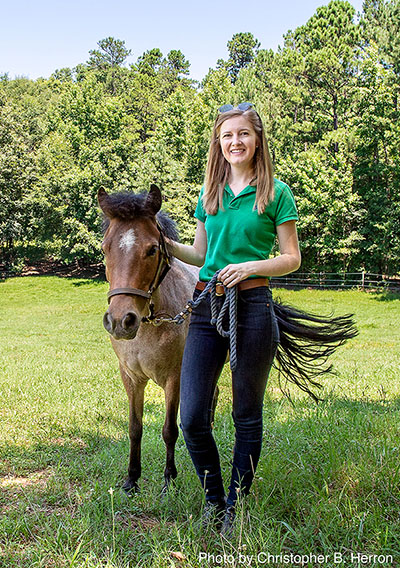For Sarah Vaughn, a dual Ph.D./D.V.M. student, choosing to attend the University of Georgia was an easy decision.
A native Georgian, Vaughn includes the brand-new veterinary teaching hospital with its cutting-edge technology and state-of-the-art facilities- including a covered equine area- in her list of reasons to study at the University.
However, perhaps the most important factor for Vaughn is the faculty.
“The people I’ve met here truly care about my development as a person, both in and out of the lab. [Completing a] Ph.D. can be a long, stressful, and isolating experience. I knew I wanted to find people who encourage me to find a work-life balance and care about my well-being as much as my results. I definitely have that through my research adviser, Dr. Kelsey Hart.”
Vaughn first became interested in veterinary medicine more than 20 years ago when her pony, Annie, developed health problems that led to an early retirement.
Vaughn still owns Annie and has made it her mission to manage Annie’s health and better understand the disease from an owner’s perspective.
PPID (Pituitary Pars Intermedia Dysfunction) is a disease that affects up to 30 percent of horses age 15 years and older and is thought to be caused by aging- related oxidative damage to the hypothalamus.
But what is the relationship between the hypothalamus and the pituitary gland?
The oxidative damage to the hypothalamus results in the loss of dopamine-producing neurons. This dopamine is a crucial hormone for the regulation of the pituitary gland, a small but important hormone-producing gland at the base of the brain.
Interestingly, oxidative damage to an area of the brain adjacent to the hypothalamus is what causes Parkinson’s disease in humans.
Many researchers consider ponies with PPID to be the best model for Parkinson’s research, meaning Vaughn’s research could have benefits for both horse and human health.
While most owners would agree that horses and ponies are endocrinologically different, the differences have never been scientifically proven. This was Vaughn’s first goal for her research.
To prove they are endocrinologically different, Vaughn measured various hormones in healthy horses and healthy ponies.
“Our preliminary data for this experiment demonstrates that even in health, ponies and horses have significantly different hormone levels that likely impact their risk of diseases like PPID,” she explains.
“In the process, I am deciphering key mechanisms in age-related neurodegenerative diseases that affect both horses and people.”
Since PPID is at least partially caused by oxidative damage to the hypothalamus, the next steps in her research will be to look at why, and how much, oxidative stress differs between horses and ponies.
“I am currently working on the ‘why’ portion by examining a gene known to be involved in oxidative protection to see if it has mutated in ponies.”
This could be the reason they seem to be more vulnerable to oxidative damage.
Next, Vaughn will test how levels of oxidative stress differ between horses and ponies, and whether or not horses and ponies respond differently to treatment with anti-oxidants.
“If we can confirm that the endocrinological difference between horses and ponies is related to a difference in susceptibility to oxidative damage, we will be one step closer to understanding and more effectively treating PPID.”
“Ongoing research means that horses and ponies diagnosed with PPID and other serious diseases are living longer than ever. As science continues to lengthen the life spans of animals, I also think it’s vital as a scientist and future clinician to think about more than just longevity.”
This is the reason that Vaughn is so invested in her project being interdisciplinary and involving a social science component in addition to the natural sciences.
“Specifically, I aim to understand how we as veterinarians best guide owners to make responsible decisions about the care of aging horses.”
For her final Ph.D. project, Vaughn will conduct a survey study to examine how veterinary schools currently prepare students to address palliative care and aging patients in large animal medicine.
Vaughn’s main goal for this part of her research is to develop better ways to address this issue.
Longer term, Vaughn plans to pursue an academic career.
“I’m drawn to the mix of teaching, research, and practice– the opportunity to see the most interesting cases in the region while continuing to work towards a future that integrates the seemingly binary system of science and social science.”
“There is also the personal, intellectual pull to stay in a university environment. I love the community that universities foster and I’m looking forward to being a part of something similar moving forward.”

